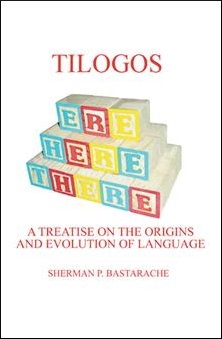 This book is written by a Canadian mechanic with an interest in the origin of language. He has obviously spent a great amount of his life reading and thinking about this question, not just as a technical quandary but rather a personal one.
This book is written by a Canadian mechanic with an interest in the origin of language. He has obviously spent a great amount of his life reading and thinking about this question, not just as a technical quandary but rather a personal one.
As a Christian with no other language knowledge past that of high school, and only English at that, he makes a grand statement with this work but sometimes he doesn’t seem to quite grasp the principle he tries to illustrate, maybe because he has not dedicated time and energy to formally studying the discipline in which he would like to present his theories.
The title “tilogos” is a made up word by the author, to describe the coming together of two sounds to form a word with meaning. The theory goes that because similar or same word-sounds or letters are used in these words, the sounds alone must have meaning historically, like animals who cry or wail for food or sex, and in turn these sounds must have an innate meaning for us in some way: it just does not sit right with the author that the human system just evolved to the communication level we have today. This was the point when I realized this book was not concerning itself with technicalities: it was the ponderings of a man more interested in social anthropology and not a book on language as a science as such.
There are moments of borderline insanity/genius in his thinking but I can’t help feeling that instead of properly acquiring the knowledge of phonologic study or linguistics, he skimmed the surface, made his own makeshift den of ideas and now has the cut corners of a craftsman bereft of the correct tools trying to create his masterpiece. I really couldn’t follow the math section. I made the decision to just gloss over it after an hour with a pen and paper. All this after the chewing over of proof of the soul and the brain explained as a car computer, all of which was somewhat confusing. He states, “I am probably more confused than you are, so I have decided only to show these possible mistakes when doing the analytical math. I only wanted to point out that mistakes could be made. I am hoping that after someone reads this book, he will be able to explain the whole book to me.”
It would have benefited the writer to check that he is using the correct terminology as any professionals reading this piece will not appreciate the wrong use of the word “phoneme” in several places (he means “phone” not “phoneme” which is a set of phones of cognitive equivalence, not a single sound) as well as the constant unabashed usage of the book of Genesis in the Christian Bible as a source of fact in a book that presents itself as a science work as if the evolution of language depended on the words spoken by Adam and Eve and what God did next.
There is also a factual presentation of the Tower of Babylon from the Bible, “If the worldwide split was Babylon and these descendents[sic] went to all the other continents, as was supposed, we would expect to see a continued search for knowledge,” In fact, in just over 300 pages, this book makes over eighty references to the Bible, all used to discuss the theory or to factually evidence the statements herein. This means that if one reads this book as a scientific theory, the work loses value immediately for me.
He says at one point, “It may seem funny to begin a chapter on the human brain by talking about myths or quotations from the Bible.” It sure does; as Richard Dawkins said, “Faith is the belief in spite of, even perhaps because of, the lack of evidence, “ and unfortunately that is the issue with this thesis: Bastarache seems reluctant to let his mind go into the godless land required to study this subject in true minutiae in case he finds something his Church may not like; he even apologizes to them half way through the book just in case. It’s not that the religious angle is offensive, but more unwanted in a book marketing itself as a linguistic science piece.
The basic premise that language sounds are from primitive grunts formed over time makes sense, but when it is rolled in the half-belief that innate knowledge enters the brain through the placenta, an ‘unknown’ source giving us language building blocks and even buying into a theory that in Adam and Eve’s time (them again) heads got bigger to support a bigger or “extra” brain based on Bible quotations where women failed to give birth due to big headed babies with extra language baggage just doesn’t add up – this theory is presented without quoted proven artifact evidence.
In general, maybe a lack of formal linguistics lets the writer down, for instance the theory based on phonetics dies when applied to French, which has no phoneme stress at all. Often the lack of training is seen, for example, when showing the words ‘here, there, where’ he states, “the words I use are only examples in English and of no real resource for proof of the theory. Older languages would have to be analyzed for proof.” misses the fact that this analysis has happened; in fact what he describes is already widely known as space deixis.
Also, the idea that grammar is innate, Bastarache paraphrasing Chomsky, is also misfired, “If our words did not mean something on an innate level, then they would just be meaningless sounds.” Then surely this would still be the case if a child born in one country to native parents and adopted into a different language group would never be able to understand? He contradicts often, soon after stating, “Just because you yourself have discovered something does not mean that it will survive with your genes; the opposite is in fact true: it will die with you, which makes memes so important.” Which seems to go against his “innate” theory, and means that cell memory, which is what is alluded to but never named, is not actually true of language after all.
Another time he insists an Old English quote contains ‘f’s instead of ‘s’s; unfortunately failing to realize that this is the result of Old English usage of the ‘long s’, basically an elongated ‘s’ with a line through it, instead of a modern day ‘s’. It is the lack of research on these points, which really prevented the valuation of the work as a study book.
All of this doesn’t mean the book is not worth a look. It fires great debate. But maybe one must approach it in a different way: I was expecting something solidly backed up, from someone with a proven background in linguistics and phonology. What one gets instead is a Christian opinion, musing profoundly about why language came about rather than its mechanics, with lots of homespun science which often has a point but sometimes goes off path into a realm of tangent half a chapter long. What would have been nice is some solid language history, structural research and the respect to call language processes what they are called rather than the claim to “detest” or “hate” the proper words: I feel it may be he just doesn’t know them, as when he hits his subject, like the automation of the car, he is happy to reel off trade terms for pages with no thought of simplifying for the reader.
There are some pockets of good writing; I did find myself going deeper than the actual building blocks of sounds to ponder linguistic communication and why it turned out that humans used it so intensely. But maybe that is a humanist view given it has been proven that blue whales have different languages and dialects, and even dog breeds have accents. Who are we to say we are the only species with complex communication mechanisms? And why does this disprove the existence of God, or prove it?
As with all the big chicken and egg questions, we are not in a place to resolve them, and maybe that is the uncomfortable truth about the origin of language also: we may never know. The book is a grand musing of a man who to his credit has dedicated a lot of time and energy to thinking about these issues, and given that many of us do not, it is reassuring to know we still have the last of the deep thinkers around us.
Links
Get an Editorial Review | Get Amazon Sales & Reviews | Get Edited | Publish Your Book | Enter the SPR Book Awards | Other Marketing Services






















First things first, I think we should set a standard. Charles Darwin’s’ mind was sharper than mine and I would plead no contest. He made numerous mistakes in his theory of species origins. Disuse fell by the wayside and his mechanism of inheritance was replaced with the knowledge of DNA one-hundred years later. Also of interest is the fact that the master, Charles Darwin co-existed with the monk, Gregor Mendel, called the father of genetics. Yet, there is no mention of the Mendel method of inheritance, Aa, Bb anywhere in any of Darwin’s works. Today, natural selection is the most powerful theory going and I believe it to be true. It got this way by having the errors replaced with the truths.